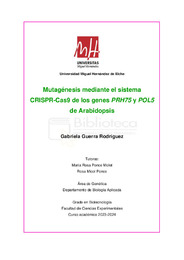Please use this identifier to cite or link to this item:
https://hdl.handle.net/11000/33163Full metadata record
| DC Field | Value | Language |
|---|---|---|
| dc.contributor.advisor | Ponce, María Rosa | - |
| dc.contributor.advisor | Micol-Ponce, Rosa | - |
| dc.contributor.author | Guerra Rodríguez, Gabriela | - |
| dc.contributor.other | Departamentos de la UMH::Biología Aplicada | es_ES |
| dc.date.accessioned | 2024-09-17T08:01:50Z | - |
| dc.date.available | 2024-09-17T08:01:50Z | - |
| dc.date.created | 2024-06 | - |
| dc.identifier.uri | https://hdl.handle.net/11000/33163 | - |
| dc.description.abstract | En este Trabajo de Fin de Grado, se ha iniciado la caracterización funcional de los motivos UP2ATMSD (AAACCCTA) y TELOBOXATEEF1AA1 (AAACCCTAA), que se encuentran conservados entre los genes que codifican factores implicados en la biogénesis del ribosoma o proteínas ribosómicas. Ambos motivos se localizan en las regiones líder de los genes POL5 y PRH75 de Arabidopsis thaliana y se han sometido a mutagénesis mediante el sistema CRISPR-Cas9. La función de PRH75 en la biogénesis del ribosoma está demostrada, mientras que la de POL5 se supone en base a la conservación funcional con sus presuntos ortólogos humano y de la levadura. Hemos analizado las mutaciones producidas en plantas T1 portadoras de transgenes CRISPR-Cas9, diseñados para editar estos motivos. Hemos empleado la coloración roja que produce la expresión del gen DsRed de Discosoma sp en las semillas T2 para distinguir entre las que ya no portarían los transgenes responsables de la edición en su genoma y que serían marrones, como las silvestres, y las rojas, que sí los portarían y, por tanto, podrían seguir editando los motivos. Hemos encontrado fenotipos característicos de mutaciones en genes que codifican factores de la biogénesis del ribosoma en las plantas T1 y en las T2 procedentes de semillas rojas, que en el caso de PRH75 resultaron estar editadas en las regiones diana de la endonucleasa Cas9. | es_ES |
| dc.description.abstract | In this Final Degree Project, the functional characterization of the UP2ATMSD (AAACCCTA) and TELOBOXATEEF1AA1 (AAACCCTAA) motifs, which are conserved among genes encoding factors involved in ribosome biogenesis or ribosomal proteins, has been initiated. These motifs are located in the leader regions of the POL5 and PRH75 genes of Arabidopsis thaliana, and have been subjected to mutagenesis using the CRISPR-Cas9 system. The function of PRH75 in ribosome biogenesis is well-established, while that of POL5 is presumed, based on functional conservation with its putative human and yeast orthologs. We analyzed the mutations produced in T1 plants carrying CRISPR-Cas9 transgenes designed to edit these motifs. We used the red coloration produced by the expression of the DsRed gene from Discosoma sp in T2 seeds to distinguish between those that no longer carry the transgenes responsible for the editing in their genome, which would be brown like wild-type seeds, and the red ones, which would still carry the transgenes and be able to continue editing the motifs. We found characteristic phenotypes of mutations in genes encoding ribosome biogenesis factors in the T1 plants and in the T2 plants derived from red seeds, which in the case of PRH75 were found to be edited in the Cas9 endonuclease target regions. | es_ES |
| dc.format | application/pdf | es_ES |
| dc.format.extent | 52 | es_ES |
| dc.language.iso | spa | es_ES |
| dc.publisher | Universidad Miguel Hernández de Elche | es_ES |
| dc.rights | info:eu-repo/semantics/openAccess | es_ES |
| dc.rights.uri | http://creativecommons.org/licenses/by-nc-nd/4.0/ | * |
| dc.subject | arabidopsis | es_ES |
| dc.subject | biogénesis del ribosoma | es_ES |
| dc.subject | POL5 | es_ES |
| dc.subject | PRH75 | es_ES |
| dc.subject | CRISPR-Cas9 | es_ES |
| dc.subject | DsRed | es_ES |
| dc.subject | ribosome biogenesis | es_ES |
| dc.subject.other | CDU::5 - Ciencias puras y naturales::57 - Biología | es_ES |
| dc.title | Mutagénesis mediante el sistema CRISPR-Cas9 de los genes PRH75 y POL5 de Arabidopsis | es_ES |
| dc.type | info:eu-repo/semantics/bachelorThesis | es_ES |

View/Open:
Guerra Rodríguez, Gabriela.pdf
3,38 MB
Adobe PDF
Share:
.png)
